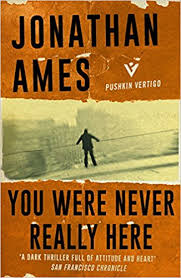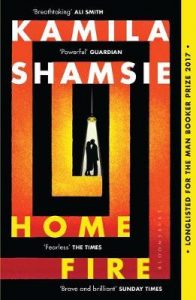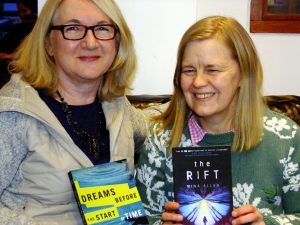 I was in Glasgow yesterday evening for an event that ran as part of the Aye, Write! literary festival and featured an interview with crime writer Nick Triplow about his recent (and excellent) biography of fellow crime writer Ted Lewis, followed by a screening of Mike Hodges’s Get Carter, the film that brought Lewis’s most famous creation to a worldwide audience. I enjoyed the event tremendously, not least for this rare opportunity to see Carter on the big screen. Michael Caine will always be Michael Caine, for good or ill, but the film’s extraordinary sense of place, its grimy textures, its evocation of a certain time remain an extraordinary achievement. Get Carter captures the seventies in a way its creators would not – could not – have been aware of at the time, the surest test of a piece of art that actually appears ageless.
I was in Glasgow yesterday evening for an event that ran as part of the Aye, Write! literary festival and featured an interview with crime writer Nick Triplow about his recent (and excellent) biography of fellow crime writer Ted Lewis, followed by a screening of Mike Hodges’s Get Carter, the film that brought Lewis’s most famous creation to a worldwide audience. I enjoyed the event tremendously, not least for this rare opportunity to see Carter on the big screen. Michael Caine will always be Michael Caine, for good or ill, but the film’s extraordinary sense of place, its grimy textures, its evocation of a certain time remain an extraordinary achievement. Get Carter captures the seventies in a way its creators would not – could not – have been aware of at the time, the surest test of a piece of art that actually appears ageless.
I booked for this event some weeks ago, and when I realised I would also be able to fit in the matinee showing of Lynne Ramsey’s new film, You Were Never Really Here, the trip suddenly became doubly worthwhile. You Were Never Really Here is based on a 2016 novella of the same name by Jonathan Ames, a text that turned out to be short enough for me to read in its entirety during my journey to Glasgow. I was thus able to experience the movie literally within an hour of reading its source text, something I don’t think I’ve ever done before and that made seeing the film almost like a weird kind of flashback. Whether this makes for a good way of looking at and thinking about adaptation I couldn’t say, but it is certainly a powerful and discomfiting one.
The Ames novella tells the story of an ex-Marine named Joe. Beaten and abused as a boy by his violent father, Joe’s trauma is broadened and deepened by his experiences in the military. He thinks constantly of suicide, and it is only his loyalty to his eighty-year-old mother, who was equally abused by Joe’s father, that keeps him going. Joe now works as a hired ‘fixer’ with a special ability in retrieving kidnap victims from their abductors. Violence is Joe’s tool, and he is an expert in its deployment. Returning to New York after a bad experience in Cincinnati, Joe is given a new job by his handler, McCleary: a senator’s thirteen-year-old daughter, Lisa, has been kidnapped. After six months of inconclusive police investigations, Senator Votto has received an anonymous text, informing him that Lisa has been put to work in a brothel frequented by rich businessmen and politicians. Joe is to recapture Lisa and return her to her father. There will be a rich reward. There are also risks, however. Votto’s father was known to be in deep with the Mafia, and there is reason to suspect that Votto may have come under pressure to conduct his political affairs in a similar fashion…
You Were Never Really Here was an almost perfect reading experience for me. Transgressive, sometimes horribly violent but often surprising in its twists and turns, fastidious and economical in its use of language, this is a novella that chews up the rulebook on show not tell (any kind of successful rule-breaking in fiction is a pump-the-air moment for me) and streams through the consciousness in a rush of blazing streetlamps and concussive hammer thwacks. Joe is a broken man, most would argue a bad man, yet as a protagonist he refuses to be categorised in such reductive terms. As a piece of writing You Were Never Really Here is a gem, as a work of noir fiction it should be famous. If you’re not keen on physical violence on the page, I’d advise caution, but otherwise I’d recommend it wholeheartedly.
I love Lynne Ramsey’s films, and her adaptation of Ames’s novella is a great piece of work that has already won prizes and should transport anyone who sees it. For me though, almost certainly because I came to the film feeling an unusually close kinship with the original text, it became a demonstration in how often film fails to reproduce the peculiar and unique intensity of a reading experience, the particular and perhaps irreplaceable intimacy of the printed page. Lynne Ramsey’s sense of place – her film-maker’s understanding of the urban landscape – is sensational, with a darkly alluring streetscene that reminded me somewhat of Steve McQueen’s 2011 film Shame. I loved the film’s composed soundtrack and its use of incidental music. And yet in spite of some standout scenes – the death of the cop in Joe’s house (a certain eighties ballad will never be the same again), the ‘funeral’ at the lake – Joaquin Phoenix was never quite ‘my’ Joe. Perhaps he just talked too much. More importantly, I found myself mystified by some of Ramsey’s choices with regard to plot changes. In the novella, much of the horror lies in our discovery of Senator Votto’s obscene betrayal of his own daughter – which in its turn mirrors the way Joe was himself betrayed by his father’s abuse. By making Votto a victim, Ramsey has stripped the story of much of its urgency and narrative drive.
I sympathised with Ramsey’s ending – her desire to give Joe a second chance – and for this reason alone I would hesitate to say that we have lost something, exactly. It is more that we have been given something different, in its own way powerful but perhaps – perhaps – less memorable. Even the violence in Ramsey’s version, though we can see it right there on the screen in front of us, feels less impactful than what we are faced with on the page.
I am sure to watch this film again at some point, and when I do, freed from the immediate influence of the text, I will almost certainly admire it more. For the moment though I am still in the world of Ames’s novella, envious and rejoicing in the power of the writer to deliver something special that cannot be replicated.


